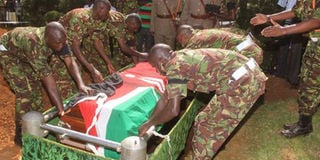Deadly gang behind latest assault named after Kenyan terrorist

KDF soldiers bury their colleague, who was killed by Al-Shabaab at El-Adde camp in Somalia, in Lelmokwo, Nandi County, on February 3, 2016. KDF soldiers in Somalia were attacked again by Al-Shabaab. PHOTO | JARED NYATAYA | NATION MEDIA GROUP
What you need to know:
- Of interest to Kenyans is the fact that the brigade was founded by and named after a Kenyan-born Al- Qaeda terrorist, Saleh Ali Nabhan, who was killed by US Special Forces in 2009.
- Born in 1981 in Mombasa’s Majengo slums, Nabhan hit the headlines when he was linked to the attacks on the Kikambala Paradise Hotel and an Israel airline in 2002.
Following the Friday dawn attack on the Kenya Defence Forces (KDF) base at Kulbiyow in war-torn Somalia, Al-Shabaab was quick to credit it to the Saleh Nabhan Brigade, a faction of the militant group which specialises in attacks on troops and civilians.
Before Friday’s attack, the brigade had been linked to a series of terrorist attacks on Kenyan soil, including the 1998 attacks at the US embassies in Kenya and Tanzania which resulted in the deaths of more than 200 people.
It was also linked to the attack on the Paradise Hotel in Kikambala in 2002 as well as the deadly attack on Kenyan forces in El-Adde, Somalia, on January 15 last year in which over 100 soldiers are believed to have been killed.
These statistics make the Saleh Nabhan Brigade responsible for the highest number of terrorist attacks on Kenyans.
Of interest to Kenyans is the fact that the brigade was founded by and named after a Kenyan-born Al- Qaeda terrorist, Saleh Ali Nabhan, who was killed by US Special Forces in 2009.
According to intelligence reports, quite a number of its fighters are Kenyan nationals.
Nabhan, a secondary school dropout, negotiated the merger between Al-Shabaab and al-Qaeda.
Born in 1981 in Mombasa’s Majengo slums, Nabhan hit the headlines when he was linked to the attacks on the Kikambala Paradise Hotel and an Israel airline in 2002.
Nabhan did his early schooling in Majengo before dropping out of secondary school to join a local madrassa.
He later travelled to the Middle East to work before coming back to Kenya where he set up a mobile phone accessories and a fruit-juice selling business.
According to a previous interview with the Sunday Nation, his family said that Nabhan had disappeared in 2002 only for his name to reappear after he was linked to the Kikambala Paradise Hotel attack.
Nabhan worked closely with Fazul Abdullah Mohammed, a Comorian who is believed to have been the mastermind behind the twin attacks on the US embassies in Nairobi and Dar es Salaam in 1998.
After the Mombasa attacks, both Fazul and Nabhan operated from various towns at the coast, including Malindi and Lamu and also inside Somalia.
In 2008, the pair escaped capture when Kenyan police commanders raided their hideout at the Coast.
It is during this raid that a Kenyan forensic team gathered their DNA samples which proved useful in confirming that he was the man killed by US Navy Seals.
After his death, the brigade was formed to honour his sacrifices to Jihad.
During the El-Adde attack, the Saleh Nabhan brigade claimed that it had killed 63 KDF soldiers. Before that, the brigade had claimed responsibility for the attack on a bus in Mandera which claimed the lives of 36 people in December 2014.
It was also linked to the July 2010 suicide bombings in Kampala, Uganda.





